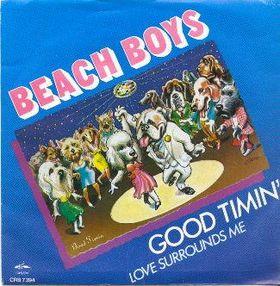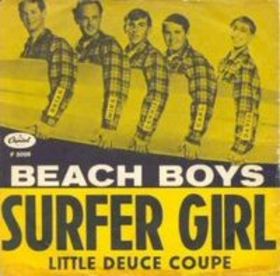Related Research Articles

The Beach Boys are an American rock band that formed in Hawthorne, California, in 1961. The group's original lineup consisted of brothers Brian, Dennis, and Carl Wilson, their cousin Mike Love, and friend Al Jardine. Distinguished by their vocal harmonies, adolescent-themed lyrics, and musical ingenuity, they are one of the most influential acts of the rock era. They drew on the music of older pop vocal groups, 1950s rock and roll, and black R&B to create their unique sound. Under Brian's direction, they often incorporated classical or jazz elements and unconventional recording techniques in innovative ways.
Surf music is a genre of rock music associated with surf culture, particularly as found in Southern California. It was especially popular from 1958 to 1964 in two major forms. The first is instrumental surf, distinguished by reverb-heavy electric guitars played to evoke the sound of crashing waves, largely pioneered by Dick Dale and the Del-Tones. The second is vocal surf, which took elements of the original surf sound and added vocal harmonies, a movement led by the Beach Boys.

David Lee Marks is an American guitarist who is best known for being an early member of the Beach Boys. While growing up in Hawthorne, California, Marks was a neighborhood friend of the original band members and was a frequent participant at their family get-togethers. Following his departure from the group, Marks fronted the Marksmen and performed and recorded as a session musician.

Carl Dean Wilson was an American musician, singer, and songwriter who co-founded the Beach Boys. He was their lead guitarist, the youngest sibling of bandmates Brian and Dennis, and the group's de facto leader in the early to mid-1970s. He was also the band's musical director on stage from 1965 until his death.

Little Deuce Coupe is the fourth album by the American rock band the Beach Boys, released October 7, 1963 on Capitol Records. It reached number 4 in the US during a chart stay of 46 weeks, and was eventually certified platinum by the RIAA. It is considered to be one of the earliest examples of a rock concept album.

Alan Charles Jardine is an American musician, singer, and songwriter who co-founded the Beach Boys. He is best known as the band's rhythm guitarist and for occasionally singing lead vocals on singles such as "Help Me, Rhonda" (1965), "Then I Kissed Her" (1965), "Cotton Fields" (1970), and "Come Go with Me" (1978). His song "Lady Lynda" was also a UK top 10 hit for the group in 1978. Other Beach Boys songs that feature Jardine on lead include "I Know There's an Answer" (1966), "Vegetables" (1967), and "From There to Back Again" (2012).

All Summer Long is the sixth album by American rock band the Beach Boys, released July 13, 1964 on Capitol Records. Regarded as their first artistically unified collection of songs, as well as one of the first true concept albums, it marked the Beach Boys' first LP that was not focused on themes of cars or surfing. Instead, the songs are semi-autobiographical and relate to the experiences of a typical Southern Californian teenager, a theme encapsulated by the title track, "All Summer Long", and the often-imitated front cover, a modernist style photo collage depicting the band members fraternizing with young women on a beach.
"Little Deuce Coupe" is a song written by Brian Wilson and Roger Christian. The song first appeared as the B-side to The Beach Boys' 1963 single "Surfer Girl". The car referred to is the 1932 Ford Model 18. "Little Deuce Coupe" became The Beach Boys' highest charting B-side, peaking on September 28, 1963, at No. 15 on the Billboard Hot 100.

The Honeys were an American girl group, formed in Los Angeles in 1958, that initially comprised sisters Marilyn, Diane, and Barbara Rovell. Barbara was later replaced by their cousin, Ginger Blake. After 1962, the Rovell Sisters were rechristened "the Honeys" by the Beach Boys' Brian Wilson, who envisioned the group as a female counterpart to his band. Wilson served as the Honeys' record producer and chief songwriter, and later married Marilyn in late 1964.

"Help Me, Rhonda" is a song by American rock band the Beach Boys, appearing first on their 1965 album The Beach Boys Today! and subsequently in re-recorded form on the following 1965 album Summer Days . It was written by Brian Wilson, with additional lyrics by Mike Love. Unlike many other songs by the band from this period, "Help Me, Rhonda" features a lead vocal sung by Al Jardine.

"Good Timin’" is a song by the American rock band the Beach Boys and the second single from their 1979 album L.A. . It is one of the few songs jointly credited to Brian and Carl Wilson.

"Surfer Girl" is a song by American rock band the Beach Boys from their 1963 album Surfer Girl. Written and sung by Brian Wilson, it was released as a single, backed with "Little Deuce Coupe", on July 22, 1963. The single was the first Beach Boys record to have Brian Wilson officially credited as the producer.

"Surfin'" is a song by American rock band the Beach Boys that was written by Brian Wilson and Mike Love. It was released as the debut record by the Beach Boys in November 1961 on Candix Records and was included on the October 1962 album Surfin' Safari.

"In My Room" is a song written by Brian Wilson and Gary Usher for the American rock band the Beach Boys. It was released on their 1963 album Surfer Girl. It was also released as the B-side of the "Be True to Your School" single. The single peaked at number 23 in the U.S. and was eventually inducted into the Grammy Hall of Fame in 1999. "In My Room" was ranked number 212 on Rolling Stone's list of The 500 Greatest Songs of All Time.
"Do You Remember?" is a song written by Brian Wilson and Mike Love for the American rock band the Beach Boys, released on their 1964 album All Summer Long. The song is a minor rewrite of "The Big Beat", an earlier composition Wilson had written for Bob & Sheri in 1963. Both songs are tributes to 1950s rock and roll, referencing performers such as Buddy Holly and Hank Ballard.
"Catch a Wave" is a song written by Brian Wilson and Mike Love for American rock band, The Beach Boys, released on their 1963 album Surfer Girl. In 1990, Wilson wrote of the song: "[It] was more rhythmic. The guitars were more clean and driving as if to say they didn't wanna stop. The piano was played by me and it was perfectly synchronized with the guitars. The 3 different sounds combined to make one unique sound. I was ecstatic about this."
"The Surfer Moon" is a song by American music duo Bob & Sheri that was released as a single in October 1962. It was written by Brian Wilson and was the first record in which he was officially credited for production. In 1963, Wilson recorded the song with his band the Beach Boys for their album Surfer Girl.

"I Do" is a song written by Brian Wilson and Roger Christian, originally released as a single by American vocal group the Castells in March 1964. The recording was also produced and arranged by Wilson. The song's lyrics illustrate a young man getting ready for marriage. Its melody was derived from "County Fair", a song Wilson had earlier written for the Beach Boys.

The Beach Boys Historic Landmark is a memorial which commemorates the site of the childhood home of Brian, Dennis, and Carl Wilson of The Beach Boys. The monument, located at 3701 W. 119th Street, Hawthorne, California, stands on the former location of the Wilsons' house, which was demolished in the mid-1980s during construction of the Century Freeway.

Pet Projects: The Brian Wilson Productions is a CD compilation album of the recorded work of record producer, songwriter, and musician Brian Wilson as he attempted to branch away from his band the Beach Boys during the early-to-mid-1960s and early 1970s. The compilation features performing artists such as Glen Campbell, Gary Usher, the Honeys, American Spring, Jan and Dean, Sharon Marie, and the Survivors. It was released with a full-color 20-page booklet with rare photos and a detailed essay.
References
- ↑ Doe, Andrew G. "1962". Bellagio 10452. Endless Summer Quarterly. Retrieved October 8, 2015.
- ↑ Carlin, Peter Ames (2006). Catch a Wave: The Rise, Fall, and Redemption of the Beach Boys' Brian Wilson. Rodale. p. 39. ISBN 978-1-59486-749-1.
- 1 2 Leaf, David (1985). The Beach Boys. Courage Books. p. 26. ISBN 978-0-89471-412-2.
- 1 2 Becoming the Beach Boys, 1961-1963, By James B. Murphy - ISBN 0786473657 - Page 216
- 1 2 The Music Lover's Guide to Record Collecting, By Dave Thompson - ISBN 0879307137 - THE TOP TEN COLLECTABLES, Surfing Singles
- ↑ Words and Music of Brian Wilson, By Christian Matijas-Mecca - ISBN 1440838984 - Page 6 - 7 Wind Up
- ↑ Becoming the Beach Boys, 1961-1963, By James B. Murphy - ISBN 0786473657 - Page 227 18 Beyond the Boys (September 1962)
- ↑ Inside the Music of Brian Wilson: The Songs, Sounds, and Influences of the Beach Boys' Founding Genius, By Philip Lambert - ISBN 0826418775 - Page 53 - 54 OTHER PROJECTS
- ↑ Becoming the Beach Boys, 1961-1963, By James B. Murphy - ISBN 0786473657 -Page 289
- 1 2 The Second Disc, December 17, 2013 - NEWS, The Beatles and The Beach Boys Beat The Boots On “The Big Beat 1963” and “Bootleg Recordings” By Joe Marchese
- 1 2 Casting Networks Inc. - VICTORIA HALE
- 1 2 The Words and Music of Brian Wilson, By Christian Matijas-Mecca - ISBN 1440838984 - Pages 6 - 7 Hits
- ↑ The Beach Boys FAQ: All That's Left to Know About America's Band, By Jon Stebbins - 5I'm Bugged at My Old Man
- 1 2 Becoming the Beach Boys, 1961-1963, By James B. Murphy - Page 289 21. Making Waves in the Midwest (April - June 1963)
- ↑ TV Guide - Victoria Hale
- ↑ Beachboys.com - RELATED ARTISTS V, The Big Beat 1963, Brian Wilson/Various Artists (MP3); Released December 17, 2013
- ↑ AllMusic - Various Artists, The Big Beat 1963
- 1 2 Spotify - The Big Beat 1963, By Various Artists, 2013 • 22 songs
- ↑ Friday Night Boys, Saturday, 14 December 2013 - https://fridaynightboys300.blogspot.com/2013/12/the-big-beat-1963.html Brian Wilson and The Big Beat 1963
- ↑ The Words and Music of Brian Wilson, By Christian Matijas-Mecca - ISBN 1440838984 - Page 14 HITS
- ↑ Goldmine Standard Catalog of American Records: 1950-1975, Tim Neely - Krause Publications, 1 Aug 2002 - ISBN 0873416333 - Page 1162
- ↑ Becoming the Beach Boys, 1961-1963, By James B. Murphy - ISBN 0786473657 - Page 217
- ↑ 45Cat - Bob And Sheri - Discography, USA
- ↑ Allmusic - Bob & Sheri, Credits
- ↑ Allmusic - Bob & Sheri, Credits